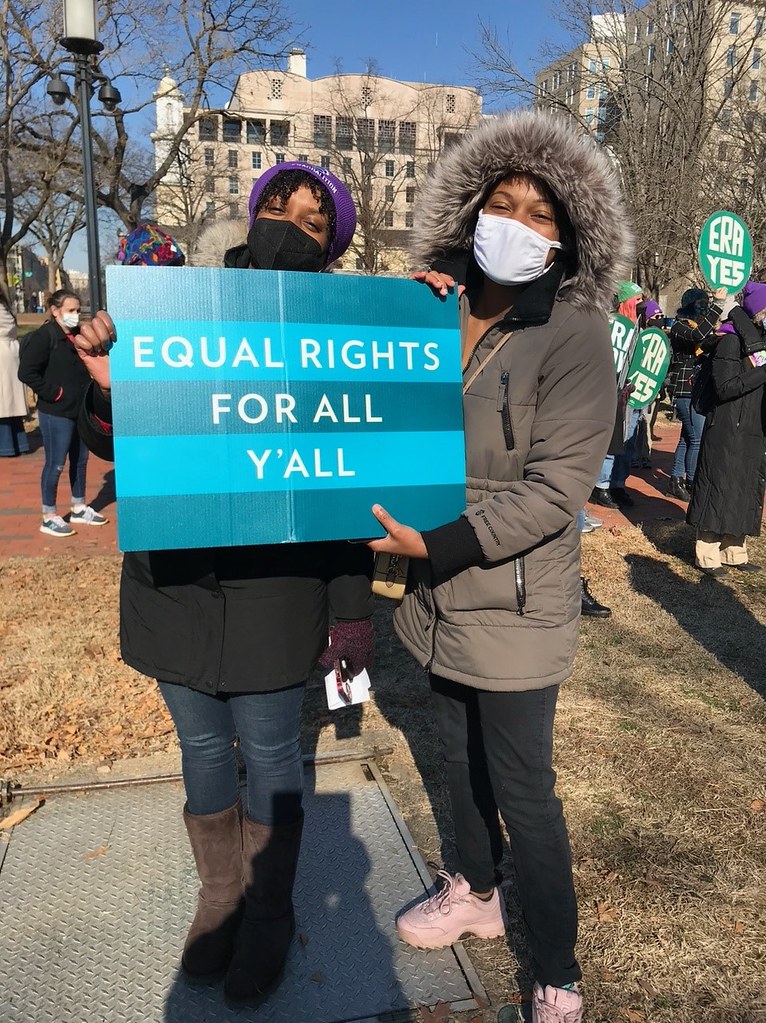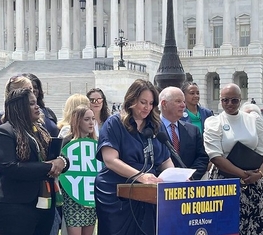
Virginia v. Ferriero (now Illinois v. Ferriero)
Case Summary
LWVUS joined 55 other civic organizations in filing an amicus brief supporting the Attorneys General of Virginia, Nevada, and Illinois. The brief supported the state attorneys general in their lawsuit to order the Archivist of the United States to certify and publish the Equal Rights Amendment (ERA), adding it to the constitution as the Twenty-Eighth Amendment.
In 1972, Congress passed the Equal Rights Amendment (ERA) by the necessary two-thirds vote and sent it to the states for ratification. Thirty-eight states were required to ratify the ERA for it to be added to the United States Constitution. The ERA enshrines equality before the law for women, as follows:
Resolved by the Senate and House of Representatives of the United States of America in Congress assembled (two-thirds of each House concurring therein), That the following article is proposed as an amendment to the Constitution of the United States, which shall be valid to all intents and purposes as part of the Constitution when ratified by the legislatures of three-fourths of the several States within seven years from the date of its submission by the Congress:
ARTICLE –
SECTION 1. Equality of rights under the law shall not be denied or abridged by the United States or by any State on account of sex.
SEC. 2. The Congress shall have the power to enforce, by appropriate legislation, the provisions of this article.
SEC. 3. This amendment shall take effect two years after the date of ratification.
By 1978, the ERA had not received the assent of thirty-eight states. Congress then extended the ratification deadline by three years, until 1982. However, by the time the new deadline passed, only thirty-five states had ratified the amendment.
In 2018, Nevada ratified the ERA, becoming the first state to do so in over thirty years. Illinois and Virginia then ratified the ERA, bringing the total number of states ratifying to thirty-eight. Illinois, Nevada and Virginia ("plaintiff states") then urged David Ferriero, the then-Archivist of the United States (“Archivist”) to certify that thirty-eight states had ratified the ERA and publish it as the Twenty-Eighth Amendment to the United States Constitution. Soon afterwards, several states sued to prevent publication, leading the “Archivist” to seek legal advice and refuse to publish the ERA, stating the deadline had passed and that the amendment process would have to start anew from the beginning.
On January 30, 2020, Virginia, Illinois, and Nevada filed a federal lawsuit in the United States District Court for the District of Columbia, requesting a court order to compel the Archivist to certify and publish the ERA. The plaintiffs asserted there was no set deadline to ratify the ERA because the text of the proposed amendment included no deadline. Rather the deadline was in the joint resolution sending the amendment to the states for ratification. The states also asserted Article V of the United States Constitution did not allow Congress to impose a deadline for ratifying constitutional amendments, and that there was no implied time limit on a state’s decision to ratify an amendment.
In response, several states, including Alabama, Louisiana, Nebraska, South Dakota, and Tennessee ("intervenor states") — states who rescinded their ratification of the ERA — intervened and filed a motion for summary judgment, arguing the plaintiffs no longer had the requisite number of states to successfully ratify the ERA under Article V, and that the ratification deadline had lapsed.
On July 1, 2020, the League of Women Voters of the United States (“LWVUS”) joined 55 other organizations on an amicus brief supporting Virginia, Nevada, and Illinois. The brief argued that Article V of the US Constitution neither permits the imposition of “any time limit” on the states’ power to ratify constitutional amendments nor allows states to rescind their ratification of an amendment.
On March 5, 2021, the district court granted the Archivist’s motion to dismiss. Illinois and Nevada appealed to the Court of Appeals for the D.C. Circuit. On January 19, 2022, LWVUS joined a second amicus brief explaining the continued necessity of the ERA to help women achieve full equality in the United States, and requesting the court of appeals reverse the district court’s dismissal of the case.
On February 28, 2023, the Court of Appeals affirmed the dismissal in a 3-0 vote, ruling Illinois and Nevada had failed to show that Congress had no authority to set a ratification deadline or that the Archivist was mandated to certify and publish the ERA.
The League was represented in this matter by The Wallace Law Firm PLC, Boies, Schiller, Flexner LLP, and Winston and Strawn LLP.
LWV Timeline
Plaintiff states file lawsuit
Virginia, Illinois, and Nevada file a federal lawsuit against David Ferriero, Archivist of the United States, in his official capacity, seeking a court order mandating he certify and publish the ERA as the Twenty-Eighth Amendment to the United States Constitution.
Archivist files motion to dismiss
The Archivist moves to dismiss the case, alleging the plaintiff states have no standing to sue and that he had no duty to act and publish the ERA. The Archivist also argues granting plaintiff states relief would require adjudicating political questions beyond the court's jurisdiction.
LWV and partners file amicus brief
LWVUS joins 55 other organizations on an amicus brief supporting Virginia, Nevada, and Illinois. The brief argues that Article V of the US Constitution does not allow imposing a time limit on states' ability to ratify a constitutional amendment or permit states to take back their ratification.
Intervenor states file motion for summary judgment
Alabama, Louisiana, Nebraska, South Dakota, and Tennessee, who had rescinded their ratifications of the ERA, file a motion for summary judgment, arguing that (1) the deadline for ratification had passed and (2) that their recissions were valid, meaning there were insufficient states to allow the ERA to go into effect.
Plaintiff states file motion for summary judgment
Plaintiff states file their motion for summary judgment, asserting that under the plain text of Article V, the Archivist was required to certify and publish the ERA. The brief argued that since (1) three-quarters of the states had ratified the ERA; (2) the text of the ERA did not include a ratification deadline, and (3) states were not allowed to rescind ratification, all conditions for a valid constitutional amendment had been met.
District court grants motion to dismiss
The district court dismisses the case, ruling the states seeking ratification of the ERA had no standing to sue, and that the Archivist had no duty to certify and publish the ERA, since the deadline for ratification was legally valid, and had passed. Following the dismissal, the League of Women Voters sends a letter to Congress asking them to remove the deadline to ratify the ERA.
Plaintiff states appeal to the circuit court of appeals
LWV files second amicus brief
LWVUS and its partners file an amicus brief requesting the D.C. Circuit Court of Appeals reverse the district court's dismissal. The brief argues Article V of the United States Constitution does not permit a time limit on the ratification of constitutional amendments. Therefore, the Archivist was required to certify and publish the ERA once the plaintiff states ratified it.
D.C. Circuit holds oral argument
A three-judge panel of the D.C. Circuit Court of Appeals, comprised of Judges Neomi Rao, Robert Wilkins, and J. Michelle Childs, holds oral argument.
D.C. Circuit affirms dismissal
In a 3-0 opinion, the D.C. Circuit affirms the district court’s dismissal of the case, finding the states did not show the Archivist had a duty to certify and publish the ERA or that Congress lacked the authority to place a time limit in the proposing clause of the ERA.





